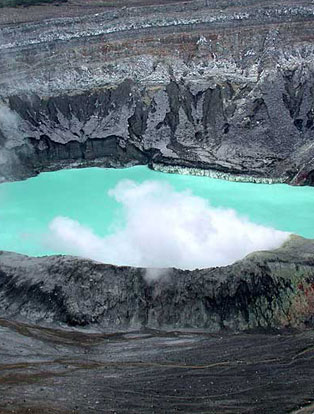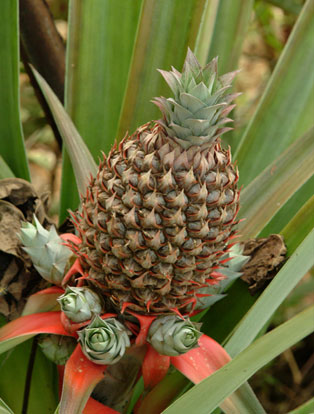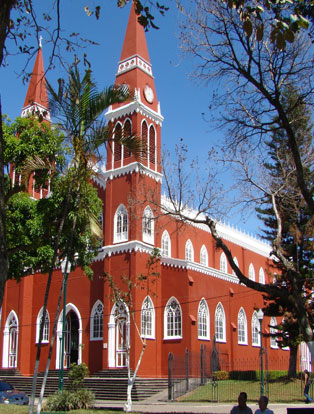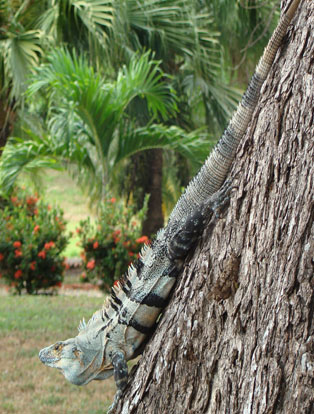Costa Rica’s History
Costa Rica: Historically ‘tranquilo’ Why doesn’t it have an army? Why are there more teachers than policemen? Is it really the Switzerland of Central America?
There are some key events in Costa Rican history that you should know about if you are to have a basic understanding of the country. Some are extended periods of time and others are brief flashes that had a profound affect on the way Ticos think about themselves and others.
- Pre-Colombian Costa Rica
- Colonial Costa Rica
- Independence
- William Walker and the Costa Rican Military
- The United Fruit Company and The Atlantic Railroad
- Liberalism in Costa Rica
- The 1948 Civil War
- History Since 1948
 Animales
Animales AU1_1
AU1_1 AU1_2
AU1_2 AU1_3
AU1_3 AU1_4
AU1_4 Iglesia
Iglesia Iguana
Iguana Rana
Rana
Pre-Colombian Costa Rica
The most developed pre-Colombian population in Costa Rica was that of the Chorotegas whose ancestors were from Mexico and migrated to the Nicoya Peninsula. They left Mexico fleeing pursuers and their name actually translates to “fleeing people.” The Chorotegas lived in cities of as many as 20,000 people which had central plazas with marketplaces and religious centers. They were excellent farmers and actually used seeds as currency. Women worked in ceramics while men farmed or fought in wars, a perpetual reality in this time. Military organizations fought to obtain land and slaves, who were sometimes used as sacrifices, some even thrown into the volcanoes of the surrounding area. Thank goodness they believed in life after death. The Chorotegas are also probably the people who created the enigmatic granite spheres that are still seen in many parts of Costa Rica. The artistic artifacts of these people are many and often beautiful with ceramics, carved jade figurines, and other exquisite pieces made of gold. Today, many examples of their art can be seen in the Jade and Gold Museums.
Colonial Costa Rica
Christopher Columbus actually landed in Costa Rica on his fourth and final voyage. He did not investigate the country thoroughly but brought back positive news to Spain about gold and the friendliness of the indigenous people which encouraged other adventurers to come.
The first attempt to colonize Costa Rica, (Veragua as Columbus called it), was made by Diego De Nicuesa. His mission failed miserably as indigenous peoples along the Atlantic coast burned the land and crops in front of the advancing invaders and eventually tropical diseases and starvation reduced the group by half. Nicuesa gave up. The second attempt was made by Juan Vásquez de Coronado who decided that the central highlands were a more hospitable location to settle. He founded Cartago, the first Costa Rican capital, in 1563 and thus began the first real Spanish settlement in Costa Rica.
In contrast to other colonies, there was no large exploitable workforce in Costa Rica, as the indigenous population had early on been decimated by war and diseases brought by the Europeans, and those who were still in the country lived scattered apart. Therefore, not a lot of Costa Ricans could gather a quantity of slaves. The lack of gold and things to be exploited quickly made the mother country forget Costa Rican colonists and Spain also refused to invest much money in their future. Costa Ricans, then, had to work the land themselves in order to survive and were forced against their dreams to become a hardworking colony. The self sufficiency that resulted played a huge part in the making of the Costa Rican people.
Costa Rica’s population grew slowly on its own with little outside influence. Over time three new cities were founded in the Central Valley: Cubujuquí (Heredia) in 1706, Villanueva de la Boca del Monte (San José) in 1737, and Villa Hermosa (Alajuela) in 1782.
Independence
In October 1821, word came that Spain had granted independence to its American colonies on September 15th. It had taken news one month to cross the mountains from Guatemala, the central point of the Spanish empire in Central America. After a brief period of internal strife, Costa Rica declared itself a state and the capital was moved from Cartago to San José.
Juan Mora Fernández was an important man in Costa Rica, not only because he was the country’s first president, but also because he set a standard for the country by concentrating on building roads and schools and most importantly giving land grants to anyone who would plant coffee. Small farmers were encouraged to grow coffee and sell the beans to wealthier farmers, who would prepare the beans for export. The relationship thus was not one sided and mutual respect was needed and cultivated between rich and poor, ideals that have generally been held through Costa Rican history.
Coffee soon became Costa Rica’s principal export. Because coffee is a product best grown in the highlands around the central valley, more and better quality roads had to be built that led to the coast in order that the coffee could be sent to the overseas markets. The wealth generated by coffee also began to bring in investment money from outside the country. Also, European immigrants trying to earn money, began to arrive. By the mid-1800’s, therefore, Costa Rica had evolved from a self-sufficient and remote colony into a cosmopolitan state influenced by many European liberal ideologies.
William Walker and the Costa Rican Military
William Walker was basically a butcher who wanted to exploit the possibilities of slavery for his mother country, the United States. His second expedition into Latin America was to Nicaragua. He had two main goals. First, convert Central America into a slave territory and annex it to the southern United States. Second, conquer Nicaragua and ready it for the construction of a trans-isthmic canal; Walker failed miserably in his participation in the California Gold Rush of 1849, but it taught him the difficulty of crossing the U.S. frontier and the potential value of a sea route; using the San Juan River to travel up from the Atlantic to Lake Nicaragua and then crossing the lake left only 18 miles to the Pacific ocean. Walker invaded Nicaragua with 58 men and held his position until 100’s of reinforcements could arrive. It was the Costa Rican people who rose up and overthrew Walker. Eventually a force of 2,000 men defeated Walker at Rivas, Nicaragua. In the action, Walker held out in a building. A young boy named Juan Santamaría volunteered to set fire to the building and succeeded in driving out Walker and his men. In the action, the boy was killed and became both Costa Rica’s and Nicaragua’s national hero by helping to defeat one of the more hated figures in Central American history.
The United Fruit Company and The Atlantic Railroad
Minor C. Keith took over the project to build the Atlantic Railroad, originally started to connect the coffee plantation to the large Atlantic port of Limón. His idea was not to exploit coffee, but instead to use his power with investors to complete the railroad in exchange for land in which to grow bananas. During the building of the railroad, a workforce of thousands of Jamaican, Italian, and Chinese workers were recruited, a fact that would change the face of the Costa Rican population permanently. The railroad was completed in 1890 and until 1970 was the only route from the central valley to Limón.
The Jamaicans that Keith and others brought in stayed on the Atlantic Coast and began to work on the banana plantations that Keith established on his newly gained lands. Keith and a partner founded the United Fruit Company, which quickly became a legendary social, economic, political and agricultural force in Costa Rica and in many other Latin American Countries. Costa Rica quickly became the world’s leading banana producer.
Not only did the company forever change the Costa Rican economy, but it also changed the face of social relations. Keith and his company were less than humane in the treatment of their workers, and San José communists organized the workers to strike against the company. They demanded regular payment of salaries, free housing, medical clinics and accident insurance and eventually forced the company to comply. Socialist strains have never left the country since this action took place.
Liberalism in Costa Rica
The birth of liberalism in Costa Rica came from the battle between the conservative church and the liberalizing state. The bishop of Costa Rica criticized the European ideas that were becoming popular with the elite and the politicians. The bishop was promptly expelled from the country in 1884 and there was an official denouncement of an earlier church-state agreement that had declared Catholicism the state religion. The public outcry against these actions was minimal.
The new liberal power was realized when for the first time in the history of Costa Rica real public elections were held in Costa Rica. The liberals were surprised when the opposition gained overwhelming support, and they became victims of the very reforms they had implemented. When the liberals tried to stop the new president from being recognized, 10,000 people flooded the streets. The people of Costa Rica obviously enjoyed their new found political power. Since then Costa Rica’s democratic tradition has endured nearly unabated until today.
The 1948 Civil War
Rafael Angel Calderón was the legally elected president between 1940 and 1944. He was a social reformer and many of his policies had a positive affect on Costa Rica. He established the University of Costa Rica, and initiated many social reforms including social security, workers’ rights to organize, land reform, guaranteed minimum wage, and collective bargaining. The problems started though when, after his term as president, Calderón ran a puppet candidate (Teodoro Picado) in an election that was widely criticized as fraudulent. With this political maneuver, Calderón had made enemies with the poor who originally had supported him.
In the next election Calderón himself ran against Otilio Ulate, who represented the unified opposition. Ulate won the election but it was close, and was contested by the government. Government forces refused to yield to Ulate, and Teodoro Picado remained in power.
José María Figueres led the opposition forces against the government. After 40 days of civil war, during which more than 2000 people died, a negotiated treaty was signed. Figueres took over as provisional president. He governed for 18 months and executed some of the most important changes in Costa Rican history including the prohibition of presidential reelection, banning of communist labor unions and parties, abolition of the army, the right to vote for women and blacks, and the establishment of a neutral body that would oversee elections. All of Calderón’s social reforms were maintained. In 1949, Figueres turned the country over to Ulate, the rightful president.
Figueres was elected president two times. This was possible because of a law allowing presidents to be reelected if not in consecutive terms. He is the only person in Costa Rican history to have done it. Figueres is recognized as one of Costa Rica’s greatest political figures and has achieved the status of a national hero.
History Since 1948
Costa Rica continued its progressive social policies through the three decades after 1948 and enjoyed a gradual upward economic trend. The basic policy of the government in the decades after the 1970’s was to become more independent agriculturally, but this actually caused a heavy dependence on imported goods needed for farming. Other problems were the continuing drop in the prices of coffee, bananas, and sugar. Costa Rica had also taken out loans to improve its infrastructure and when these loans came due, Costa Rica could not pay and soon its economy was in shambles. Magnifying the country’s problems was the instability of Nicaragua and Panama, which did nothing else but hurt Costa Rica. The reputation of Central America as a place of violence and poverty stopped much potential investment. Also, Costa Rica’s status as one of the wealthiest third world countries brought a flood of immigrants from its two neighboring countries, taking jobs and money out of the country.
Oscar Arias was elected president in 1986. One of his primary goals was to work for peace in Central America. As is well known by now, Arias’ efforts gained him the 1987 Nobel Peace Prize. Many Costa Rican’s have varying opinions about Arias’ job as president of Costa Rica, but his efforts in Central America have certainly had a profound effect on the region’s outlook. Many Latin Americans feel that the wars that have shredded apart the region have finally ended, and that this gives them the opportunity to unite their futures in a new and profitable direction.
José María Figueres was one of the youngest Presidents in history. He worked with a group of elite, mostly foreign-educated experts who occupy governmental posts. He promised to remedy the problems facing the poor, but the same forces that have frustrated Costa Rica’s economic programs for years are undermining his. For years administrations have tried to implement the “structural adjustment programs” recommended for Latin America by international institutions . Though maintaining a relatively low level of unemployment, the privatization of much of Costa Rica’s public sector, and the slashing of government jobs have recently caused some of the bitterest strikes in Costa Rican history.
The public infrastructure is deteriorating, from schools to roads, and the rural and urban poor feel that they are being ignored. Small farmers are feeling the pain of monocrop plantations owned by wealthy corporations, and what was once the heart of the Tico economy and lifestyle is disappearing. The current president, Miguel Angel Rodríguez took office in mid-1998 and currently faces the same challenges as his predecessor. It is clear that change is necessary, but of course, the transition is painful. Costa Rica is seen as an interesting test site for a Latin American economy that is trying to make the transition to a globalized world.
